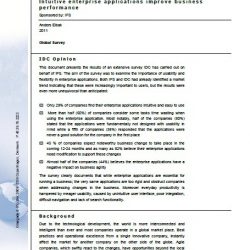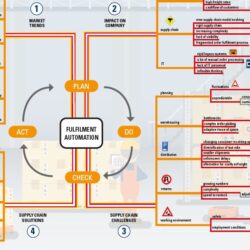‘Management is lagging in optimizing the use of data’

Companies are missing out on transformation opportunities due to a combination of outdated technology platforms and a lack of understanding of the essential role of the composability of software applications in unlocking business data at board level. This is according to research by ERP vendor IFS and integration platform Boomi, conducted by analyst firm IDC.
The survey – among 1,000 C-level respondents in 12 countries across Europe, North America, EMEA and Asia-Pacific – also shows that most companies feel they have weathered the business disruptions of recent years well. They currently consider the biggest challenges to be balancing working capital and inventory (56%), the instability of market demand (53%) and unpredictable supply chains (48%).
In addressing these challenges, respondents encountered obstacles such as outdated applications (60%), lack of integration (48%) and inflexible or monolithic applications (43%) in which one application is used to do everything: HRM, sales, marketing, service, etc. Respondents also pointed out the potential costs associated with the lack of effectiveness due to these barriers.
Outdated technology
According to IFS, the survey clearly shows that outdated technology platforms have severe consequences. For example, 18% of respondents experience negative effects of departmental silos, resulting in an ongoing lack of data visualization (24%). This highlights companies’ limited ability to plan for the long term, according to IDC researchers. According to them, it poses “a significant threat to business agility and the ability to respond to future disruptions”.
Over 41% of companies say they do not have a composability strategy. They risk stagnation and mounting technical debt, according to IDC. Although a significant majority of respondents (70%) understand the value of composability, primarily C-level respondents with operational responsibilities are knowledgeable about it.
However, senior executives lag behind in their understanding of composability, with only 19% recognizing its value. Therefore, according to IDC, there is an urgent need for greater awareness at board level and clear business arguments highlighting the short-, medium- and long-term benefits of composability.
Who benefits from composability?
According to the survey, the domains that benefit most from composability are supply chain (51%), procurement (47%), customer service and support (40%), customer experience (36%) and scalability for new business opportunities (51%). “To stay relevant in the market, develop resilience and increase efficiency in all business aspects, it is crucial to embrace composability,” say the researchers.
They say a solid data infrastructure and an advanced cloud strategy are necessary to quickly generate value and implement innovative technologies. “Failing to make this transition to the cloud or develop a coherent composability strategy can prevent companies from taking full advantage of AI and machine learning and extending the benefits they are already experiencing.” These benefits include lower costs (15%), faster time to market (14%), improved business planning (14%), and increased agility and risk mitigation (14%).
According to IDC, it is now up to companies to create value across all layers of the organization. “This requires overcoming significant challenges, including the lack of understanding of the value of composability at board level (54.5%) and insufficient cloud maturity (50%). Not surprisingly, CIOs and CTOs are the leading proponents of composability.”
Bringing data together
“In most industries, the move to the cloud has taken longer than expected. For many companies, security and the impact of the change on the organization were important considerations,” states Alex Rumble, SVP Product Marketing and Corporate Communications at IFS.
“Composability is different. That’s because ultimately it’s not about technology, but about bringing together data that accelerates the use of AI and realizes business value faster. This offers benefits in terms of speed of innovation and time-to-market, efficiency across the organization and increased productivity of people and assets,” Rumble adds.
“Composability offers the opportunity for flexibility and long-term planning, whether for investing in field assets, investment planning, or pursuing new revenue streams. The good news is that functional and operational leaders already recognize the benefits of composability. Now it is a matter of ensuring a broader understanding at board level and a shift in mindset regarding composability and AI.”










